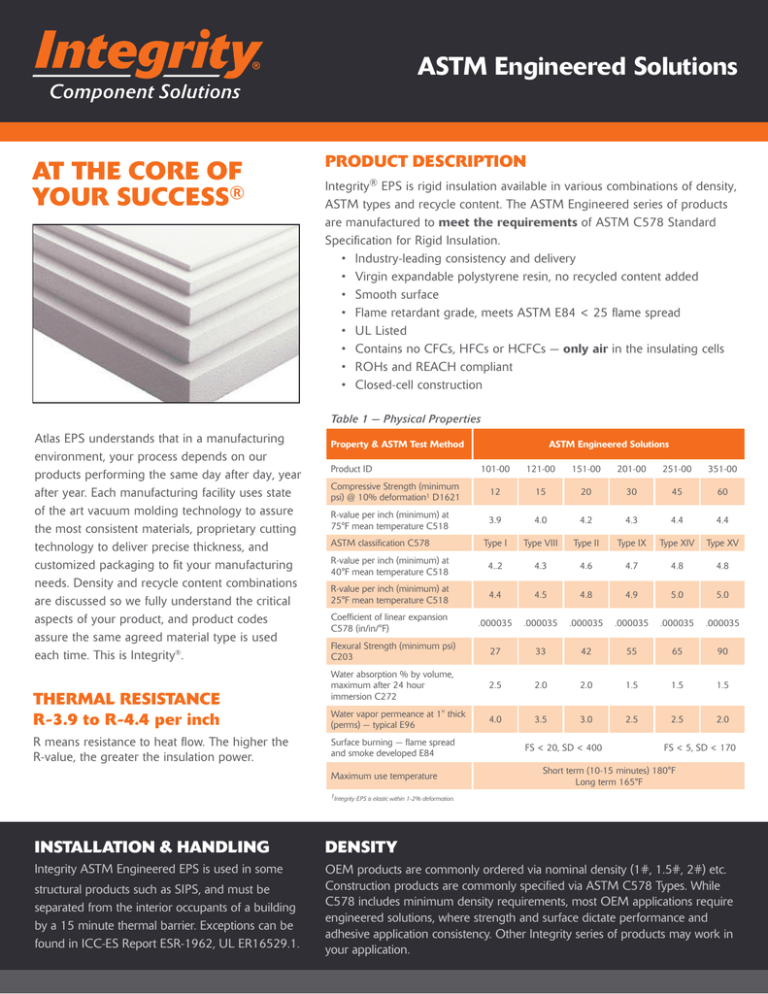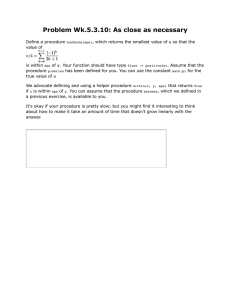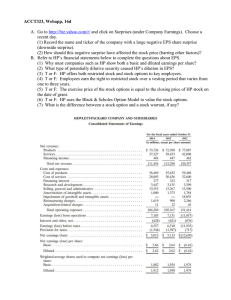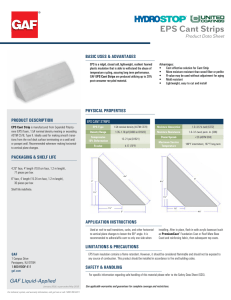Integrity ASTM Engineered Solutions
advertisement

ASTM Engineered Solutions AT THE CORE OF YOUR SUCCESS® PRODUCT DESCRIPTION Integrity® EPS is rigid insulation available in various combinations of density, ASTM types and recycle content. The ASTM Engineered series of products are manufactured to meet the requirements of ASTM C578 Standard Specification for Rigid Insulation. • Industry-leading consistency and delivery • Virgin expandable polystyrene resin, no recycled content added • Smooth surface • Flame retardant grade, meets ASTM E84 < 25 flame spread • UL Listed • Contains no CFCs, HFCs or HCFCs — only air in the insulating cells • ROHs and REACH compliant • Closed-cell construction Table 1 — Physical Properties Atlas EPS understands that in a manufacturing environment, your process depends on our products performing the same day after day, year after year. Each manufacturing facility uses state of the art vacuum molding technology to assure the most consistent materials, proprietary cutting technology to deliver precise thickness, and customized packaging to fit your manufacturing needs. Density and recycle content combinations are discussed so we fully understand the critical aspects of your product, and product codes assure the same agreed material type is used each time. This is Integrity®. THERMAL RESISTANCE R-3.9 to R-4.4 per inch R means resistance to heat flow. The higher the R-value, the greater the insulation power. Property & ASTM Test Method Product ID ASTM Engineered Solutions 101-00 121-00 151-00 201-00 251-00 351-00 Compressive Strength (minimum psi) @ 10% deformation1 D1621 12 15 20 30 45 60 R-value per inch (minimum) at 75°F mean temperature C518 3.9 4.0 4.2 4.3 4.4 4.4 Type I Type VIII Type II Type IX Type XIV Type XV R-value per inch (minimum) at 40°F mean temperature C518 4..2 4.3 4.6 4.7 4.8 4.8 R-value per inch (minimum) at 25°F mean temperature C518 4.4 4.5 4.8 4.9 5.0 5.0 Coefficient of linear expansion C578 (in/in/°F) .000035 .000035 .000035 .000035 .000035 .000035 Flexural Strength (minimum psi) C203 27 33 42 55 65 90 Water absorption % by volume, maximum after 24 hour immersion C272 2.5 2.0 2.0 1.5 1.5 1.5 Water vapor permeance at 1" thick (perms) — typical E96 4.0 3.5 3.0 2.5 2.5 2.0 ASTM classification C578 Surface burning — flame spread and smoke developed E84 Maximum use temperature FS < 20, SD < 400 FS < 5, SD < 170 Short term (10-15 minutes) 180°F Long term 165°F 1Integrity EPS is elastic within 1-2% deformation. INSTALLATION & HANDLING DENSITY Integrity ASTM Engineered EPS is used in some OEM products are commonly ordered via nominal density (1#, 1.5#, 2#) etc. Construction products are commonly specified via ASTM C578 Types. While C578 includes minimum density requirements, most OEM applications require engineered solutions, where strength and surface dictate performance and adhesive application consistency. Other Integrity series of products may work in your application. structural products such as SIPS, and must be separated from the interior occupants of a building by a 15 minute thermal barrier. Exceptions can be found in ICC-ES Report ESR-1962, UL ER16529.1. CODE COMPLIANCE Integrity ASTM Engineered EPS complies with the model building codes when properly installed: • Surface burning — UL BRYX.R16529 • Cal Std Reg #CA472 • International Energy Conservation Code • ASTM C578 — see product marking for Type • International Residential Code (IRC) — ICC-ES Report ESR-1962, UL ER16529.1 • International Building Code (IBC) — ICC-ES Report ESR-1962, UL ER16529.1 • CAN/ULC S102.2, S701 — ULC BOZCC.R16529 QUALITY ASSURANCE SYSTEM Atlas EPS utilizes the best practices of ISO-9001, while remaining agile enough to customize solutions for each client. Fitness for use is assured through initial product sampling, process inspection, and ERP backed specifications for every single product you buy. If an issue arises, root cause and corrective action are completed with a goal of not more than 72 hour turnaround. SAFETY SDS for this product available at www.atlaseps.com. Dust generated from sanding or cutting Integrity EPS should be avoided using a dust mask as with other building materials. Integrity EPS is combustible and the product should be protected from ignition sources such as open flames or welder’s torch. Applications not specifically listed in ICC-ES Report ESR-1962 or UL ER16529.1 require permanent separation of Integrity EPS from the interior of the building by a thermal barrier such as drywall or concrete for fire safety. MOLD RESISTANCE Integrity EPS has been tested against 4 week exposure to various mold and fungi via ASTM G21, D3273, and C1338 with no growth of spores on the product. Integrity EPS provides no nutritive value for mold. However, construction practices greatly impact mold growth, and fungi have been known to even grow on glass. ENVIRONMENTAL Integrity EPS uses air in the insulating cells, emitting no gasses. Integrity EPS is readily accepted for recycle at many drop off locations. Visit www.epspackaging.org to locate a drop-off location nearest you. CHEMICAL & PHYSICAL PROPERTIES Table 1 lists the physical properties of Integrity EPS. Chemical resistance is listed in Table 2. Contact Technical Services for compatibility of materials not listed. Table 2 — Chemical Compatibility of Integrity EPS Inorganic Acids (Muriatic, Sulfuric, Boric Acid) Excellent Organic Acids (Carbolic, Citric, Acetic Acid) Good Bases (Sodium Hydroxide, Potassium Hydroxide, Ammonia) Excellent Alcohols (Methanol, Ethanol, Isopropyl Alcohol) Good Beer, Tea, Coffee, Carbonated Soda, Water, Fruit Juice Excellent Household Liquid Spray Insecticides (non-aqueous) Poor Cement Excellent MEK, Methylene Chloride, Acetone Poor Antifreeze (Ethylene Glycol — Green, Propylene Glycol — Orange) Hydrocarbons (Hexane, Gasoline, Diesel, Kerosene) Mineral Oil Other Oils (Corn, Motor, Palm, Coconut Oil) Excellent Poor Excellent Good Agricultural (Manure, Feed, Urine, Soil, Fertilizer) Excellent Formaldehyde, Turpentine, Chloroform, Naphtha) Poor Salts (Ammonium, Ferrous, Sodium Chloride, Sulfur) MDI-based Adhesive (Gorilla Glue, Fast-Tac, Dow Great Stuff) Bleach, Detergents, Borax Cured Mastic, Construction Adhesive, Hardened Asphalt Wherever XPS insulation is used Excellent Good Excellent Good Excellent Excellent = No degradation, no effect from exposure Good = some effect from exposure, but not significant for product performance Poor = significant degradation affecting performance, up to completely dissolving product This table is a guide only — consult Atlas Technical Services for specific chemical design questions ATLAS, the Globe Logo, and Integrity are registered trademarks of Atlas Roofing Corporation Atlas EPS, a Division of Atlas Roofing Corporation 8240 Byron Center Ave SW, Byron Center, MI 49315 800.917.9138, AtlasEPS.com LIT1047 Rev 09-06-2016


